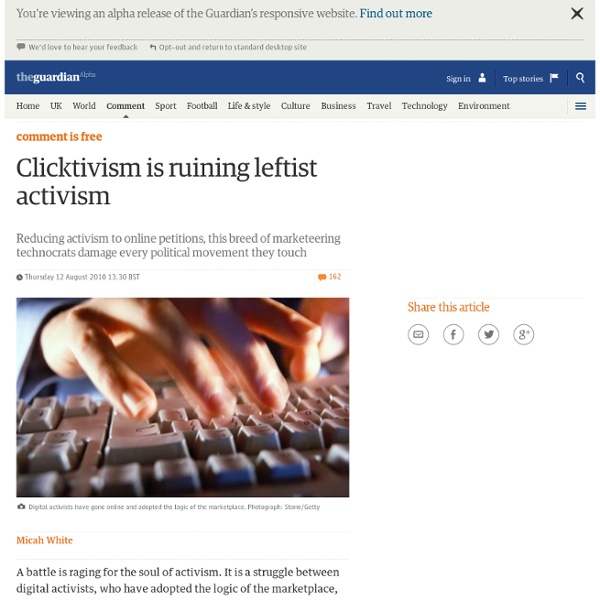Twitter, Facebook, and social activism
At four-thirty in the afternoon on Monday, February 1, 1960, four college students sat down at the lunch counter at the Woolworth’s in downtown Greensboro, North Carolina. They were freshmen at North Carolina A. & T., a black college a mile or so away. “I’d like a cup of coffee, please,” one of the four, Ezell Blair, said to the waitress. “We don’t serve Negroes here,” she replied. The Woolworth’s lunch counter was a long L-shaped bar that could seat sixty-six people, with a standup snack bar at one end. By next morning, the protest had grown to twenty-seven men and four women, most from the same dormitory as the original four. By the following Monday, sit-ins had spread to Winston-Salem, twenty-five miles away, and Durham, fifty miles away. The world, we are told, is in the midst of a revolution. These are strong, and puzzling, claims. Some of this grandiosity is to be expected. What makes people capable of this kind of activism? This pattern shows up again and again.
CHOMISTE LAND - La boite à outils du chômeur
EtherPad: Realtime Collaborative Text Editing
Casually Pepper Spray Everything Cop
About Pepper Spray Cop (also known as “Casually Pepper Spray Everything Cop”) is a photoshop meme based on a photograph of a police officer offhandedly pepper spraying a group of Occupy protesters at the University of California Davis in November 2011. Origin UC Davis Occupy Protest On November 18th, 2011, a group of students at the University of California Davis gathered on campus for an Occupy protest, during which they formed a human chain by linking their arms together. A photo of Lieutenant John Pike pepper spraying seated students at the UC Davis protest was taken by Louise Macabitas and posted to Reddit on November 19th, 2011. Photoshop Meme Two photoshopped versions of Macabitas’ photo surfaced on Reddit on November 20th. Spread Compilations of the images began appearing on Facebook community Occupy Lulz and BoingBoing on November 20th. Over the next month, Pepper Spray Cop images were shared and discussed on CBS News, CNet, The Week and Scientific American. Notable Examples
DANMS.org
Cyber-Monday Mystery: Where Are Missing Emails?
Reports are getting louder that some - perhaps as many as one in four - email marketing messages sent on Cyber Monday were not delivered to recipients' inboxes. Nearly one-fourth of email marketing messages did not reach their intended destinations, according to new deliverability data released by Pivotal Veracity. Though it has been dubbed the biggest online shopping day of the year, this past Monday saw inbox delivery rates plummet to a seven-day low of just 76.2%. There were several factors that hampered delivery, the company said. These started with the huge wave of offers and specials sent out by marketers. As delivery queues became packed, however, the ISP spam filters went on high alert and discarded a number of the messages, according to Deirdre Baird, Pivotal Veracity's president and CEO. The Retail Email blog also believes marketing messages went astray this week. Traffic Still Huge The missing emails apparently didn't translate into curtailed sales or sites visits. What To Do?
crystal cox, $25 million libel
A few days ago, I posted a piece about the Pepper Spray incident at UC Davis. When people saw the original video clip, they overwhelmingly supported students and felt the police had acted harshly and without justification. When I posted a longer video clip, those who commented on my blog, on Twitter and Facebook were about evenly divided on whether police actions were justified or not. The point of my post seems to have gotten a little lost. Yesterday, an Oregon Judge ruled that Crystal L. Social media and traditional media is all media. So while I think Cox deserves to be called a journalist, protected by Shield Laws, I don’t think she is a very good one. In reading the Cox blog post, I am unsure whether or not what she wrote is true, and truth is the ultimate defense of libel. In short, while I absolutely defend Cox’s right to be a journalist, I do not defend a blogger’s right to slander someone. To me this case and the Pepper Spray Videos are two closely related issues.
Google bets on Africa as the next internet hotspot
To global search giant, Google, Africa is the next Internet hotspot. Globally, there are 94 domains registered per 10 000 users. However, in Africa, there is only one domain per 10 000 users. As such, there is tremendous potential for growth on the continent in the web space. Through its Africa programs focused on getting more Africans online, the company is betting that by developing an accessible, vibrant and self sufficient Internet ecosystem on the continent many more Africans would come online. Key among its strategies to develop the continent’s Internet ecosystem is to increase the amount of local African content online. To do this effectively, the company has launched initiatives such as the Get African Business Online (GABO) initiative last year as a pilot to a select number of businesses in Nigeria. Interestingly, thinking local has started to pay off. Thinking local has also involved thinking of creative ways to market Google products to an African audience.



